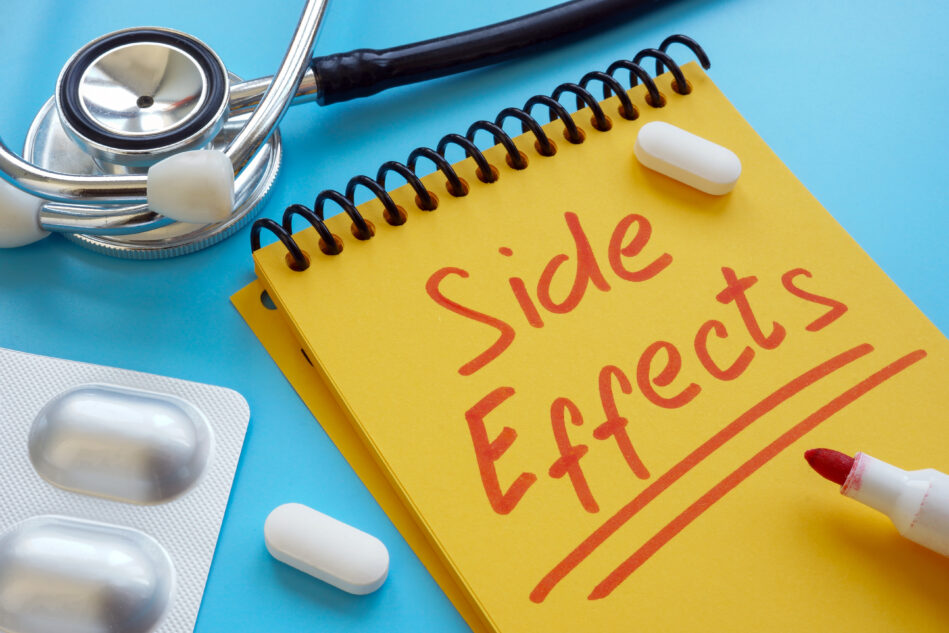Learn Why Side Effects Occur
In the real world, drugs interact with complex systems in the human body and with other drugs in the system. Side effects happen. Below we will explore the major causes of side effects.
Side effects are the downside of medicine. They are the pit in the cherry, the pie in the face at a party. Drugs can save your life and side effects (at their worse) can make it not worth living.
Side effects are the unwelcome responses your body has to a drug. Long-term effects take more time to establish or be discovered. You can find a highly simplified example with the sleep aid Ambien (zolpidem). Effect: Induces sleep. Side effect: Can cause lingering drowsiness the following morning. Long-term effect: Continued use can make it difficult to sleep without Ambien.
Some side effects can be predicted based on the method of action. The hot new drug Addyi (flibanerin) for low libido in women works in part by lowering the inhibition areas of the prefrontal cortex. Can impulse control issues be far behind?
More than 4 million people a year are rushed to the ER due to side effects from the medications they’re taking. Countless others suffer on, take additional meds to counter the side effect or stop taking needed medicines. So what causes side effects?
1. Drugs interact with multiple body systems
No drug can target one part of the body and not affect others. Swallow an antidepressant, for example, and it will travel through and potentially affect your entire digestive system in addition to interacting with your brain. When possible opt for a lotion version or an inhaler in order to limit the body systems affected. But even so, drugs leave the body through the liver and kidneys, so those organs will still have some stress.
Steroids are a good example of mitigating side effects via delivery system: If taken orally, for a back pain injury perhaps, many people will experience mood swings, hunger and weight gain. Used in a nebulizer to manage asthma, the drug is targeted directly to the affected airway paths. Much less of the drug can be used and it will have less of an effect on the rest of your systems. It will still clear through the liver and kidneys, however.
2. Interactions with other drugs, food or drink
Drug trials are conducted in a ideal environment. The trial participants are hand-selected to have the exact characteristics being tested for and are tightly controlled for other factors that may cloud the impact of the medication. In real-world distribution, drugs are prescribed to people who might have more than one condition. High blood pressure medicine was likely tested against a broad group of adults who were healthy except for high blood pressure. Once in the market the drug might be prescribed to a person with high blood pressure and diabetes. Or high blood pressure and depression.
3. Taking a drug for a long time
Over time your body might become more sensitive to a drug for many reasons including aging or weight loss. Some drugs can build to a toxic level in your system. You could become desensitized as your body acclimates to it, and you’ll need a higher or more frequent dosage. Minor side effects can become more unpleasant as exposure to a drug increases.
4. Your immune system might revolt
After taking a drug without a problem, your body might develop antibodies to fight it. Or a drug that is safe for many people might provoke a reaction in those with hypersensitivity to it. Some drugs have tests for an immune system reaction, but most don’t.
New drugs are of particular concern. Drug trials reveal only the most common side effects because of the small amount of people in the trial. When it’s released to the general public we find out about the 1-in-500 or -1,000 and less frequent but not insignificant effects. Many professionals suggest it takes 3 years in the market to get a full picture of how the drug works in real life situations.
It’s not unusual for 2 nearly identical drugs to have differing side effects when used by one person. Some people experience muscle aches with one type of statin, for example, yet have no trouble tolerating a different type of statin or even a generic version. If you need a drug and side effects are keeping you from feeling healthy, speak to your doctor. There are nearly always alternative drugs available or changes in lifestyle that might make using a drug unnecessary.






